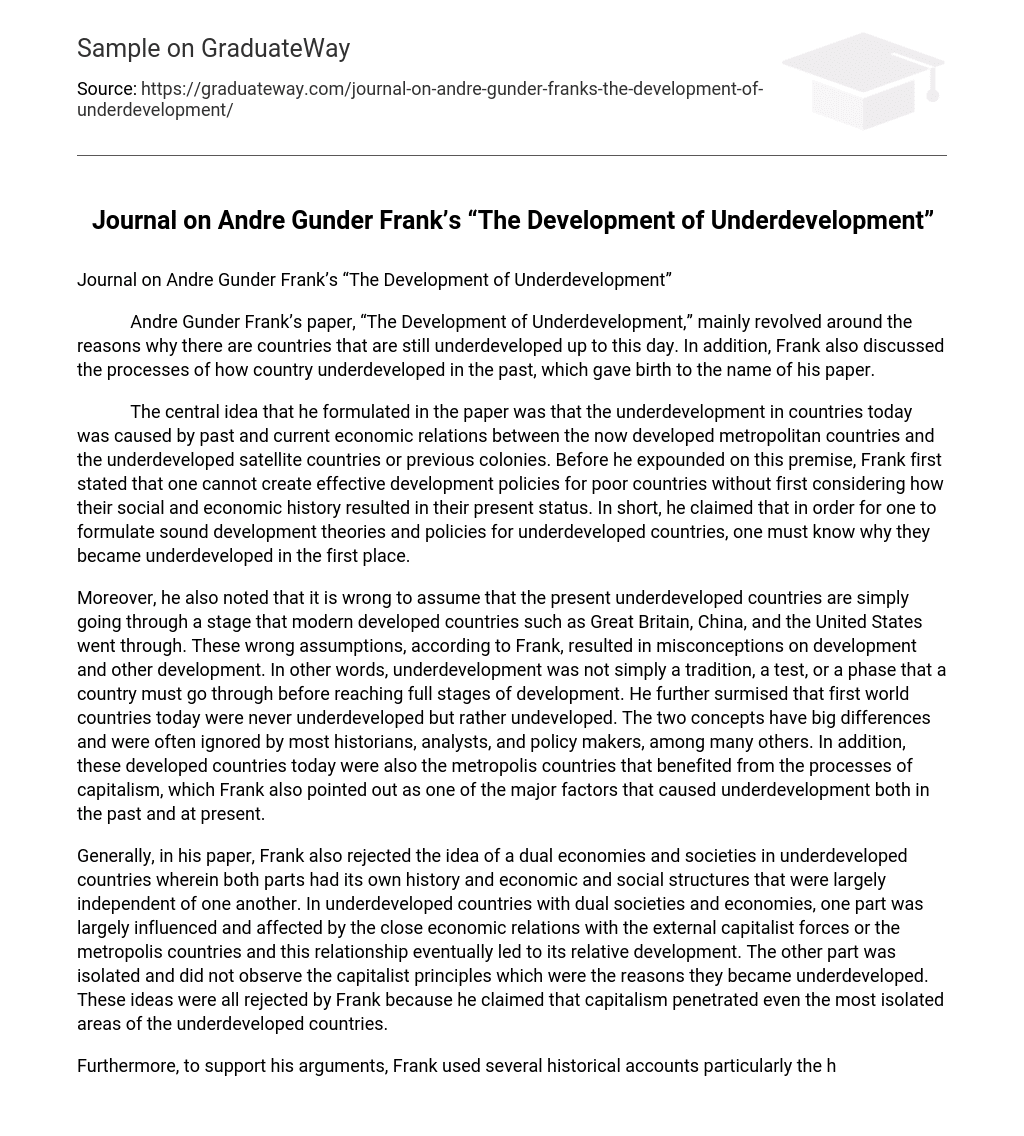Andre Gunder Frank’s paper, “The Development of Underdevelopment,” mainly revolved around the reasons why there are countries that are still underdeveloped up to this day. In addition, Frank also discussed the processes of how country underdeveloped in the past, which gave birth to the name of his paper.
The central idea that he formulated in the paper was that the underdevelopment in countries today was caused by past and current economic relations between the now developed metropolitan countries and the underdeveloped satellite countries or previous colonies. Before he expounded on this premise, Frank first stated that one cannot create effective development policies for poor countries without first considering how their social and economic history resulted in their present status. In short, he claimed that in order for one to formulate sound development theories and policies for underdeveloped countries, one must know why they became underdeveloped in the first place.
Moreover, he also noted that it is wrong to assume that the present underdeveloped countries are simply going through a stage that modern developed countries such as Great Britain, China, and the United States went through. These wrong assumptions, according to Frank, resulted in misconceptions on development and other development. In other words, underdevelopment was not simply a tradition, a test, or a phase that a country must go through before reaching full stages of development. He further surmised that first world countries today were never underdeveloped but rather undeveloped. The two concepts have big differences and were often ignored by most historians, analysts, and policy makers, among many others. In addition, these developed countries today were also the metropolis countries that benefited from the processes of capitalism, which Frank also pointed out as one of the major factors that caused underdevelopment both in the past and at present.
Generally, in his paper, Frank also rejected the idea of a dual economies and societies in underdeveloped countries wherein both parts had its own history and economic and social structures that were largely independent of one another. In underdeveloped countries with dual societies and economies, one part was largely influenced and affected by the close economic relations with the external capitalist forces or the metropolis countries and this relationship eventually led to its relative development. The other part was isolated and did not observe the capitalist principles which were the reasons they became underdeveloped. These ideas were all rejected by Frank because he claimed that capitalism penetrated even the most isolated areas of the underdeveloped countries.
Furthermore, to support his arguments, Frank used several historical accounts particularly the history of Latin America’s economic and social development. He explained that the world economic system was more or less a metropolis-satellite structure. The metropolis consisted of progressive countries like those in Europe or the United States, which were both also the centers of capitalism, while satellite countries or those that are undeveloped included countries such as Chile and Brazil. Under this structure, the metropolis countries monopolized the economy and society of their satellite countries for their own economic and social interests and gains. In his examples, he showed that in Chile, the world mercantile quickly expanded and later adopted an industrial capitalist system. However, this capitalist system eventually paved the way for Chile to succumb to the metropolis-satellite structure as its economic gains were vastly exploited by the more powerful and more advanced countries. Moreover, Frank illustrated how Brazil was once a country that experience massive economic development due to its exports but its development was gradually halted when its economy was incorporated into the world capitalist system. However, he also noted that Brazil apparently had a chance to further develop its economy through the emergence of Sau Paulo, which was one of its regions, as an industrial powerhouse. But instead of helping the development of other Brazilian regions, Sau Paulo converted these regions into smaller colonial satellites that it exploited. From the arguments that Frank presented above, it can be surmised that underdevelopment was ironically caused by the development of the processes of capitalism itself.
On the other hand, Frank also surmised that these satellite countries experienced their greatest development when their relationships and economic ties with the metropolis countries were at their weakest points. Countries such as Mexico, Argentina, and Brazil, all experienced significant industrial developments specifically during the two World Wars mainly due to weakening of their investment and trade ties with metropolis countries. Moreover, Frank noted that the incorporation of the metropolis-satellite structure had even more dramatic effects on area that were previously non-colonized or occupied. This was best exemplified by Buenos Aires when it became a satellite of Britain, which resulted in the destruction of its manufacturing capabilities and limited its development. In short, it can be said that the incorporation of a capitalist system can directly cause the underdevelopment of countries especially under a structure in which the metropolis countries use the economic gains of its satellite countries or colonies.
In general, most of the points that Frank raised were especially to countries that were once colonized. Moreover, his arguments had solid foundations because he used specific evidences such as historical events to substantiate his claims. In a way, his ideas and claims provided a different perspective on capitalism and on the understanding of both the development and the underdevelopment of a country. Although I agree with his arguments, it was noticeable that he is a Marxist because he also explored the concept of classes in society. While the Marxist principles have strong points, it’s no longer applicable today because the market, economies, and societies of the world have become more complex. Nevertheless, Frank’s claim that underdevelopment is not simply a traditional phase is still true today.
References
Frank, A.G. (1966). The Development of Underdevelopment. Monthly Review Foundation Inc. Monthly Review Volume 18.





